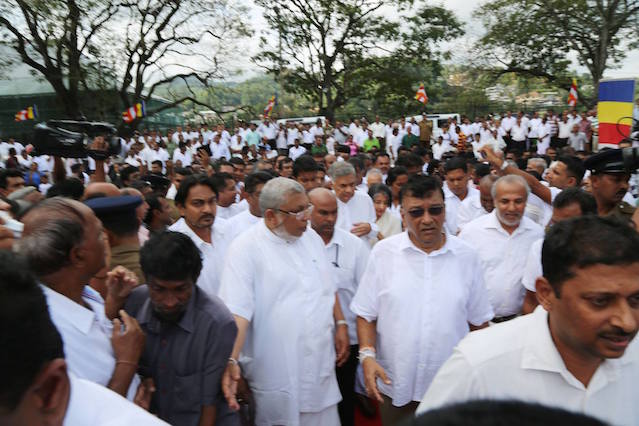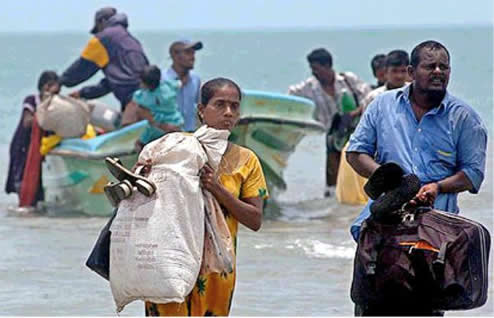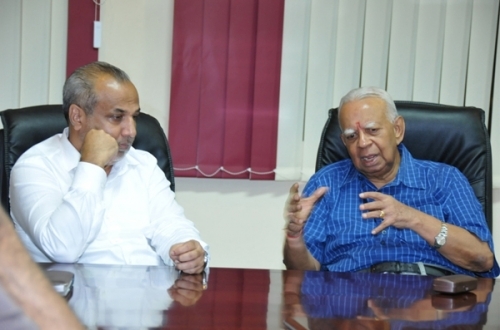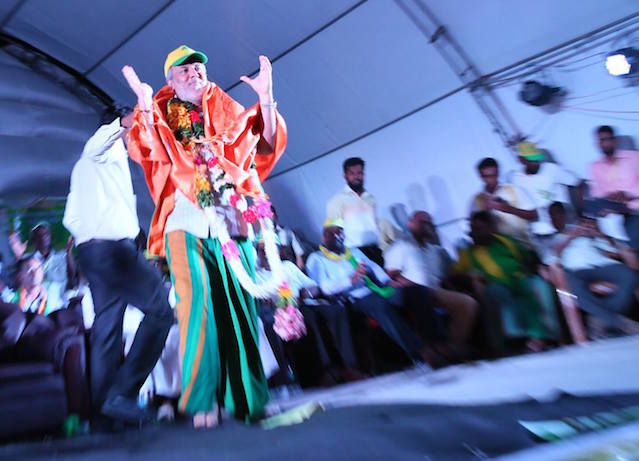Will
the burning issues of the island’s Muslim community be addressed under a
United National Front for Good Governance, UNFGG, government led by
United National Party?
This
has become the main common concern especially of the civil society of
the Muslim community island wide. This is especially so in the context
of the presence of Sri Lankan Muslim Congress, SLMC, and its splinter
groups in the UNFGG.
They
express the fear that the Sri Lanka Muslim Congress, SLMC, and its
splinter groups which have entered into agreements with the UNP, will
accept ministerial portfolios in the event of a UNFGG victory in the
forthcoming August 17 parliamentary elections and abandon the community
as they had repeatedly done in the past.
This
has been SLMC’s and their splinter groups’ track record .Therefore
Muslims are keen to prevent the SLMC and its splinter groups hijacking
the community in the forthcoming August 17 parliamentary election for
positions and personal benefits.
As
rightly pointed out by the leader of Tamil National Alliance, TNA,
leader Mr. Sampanthan in his Sunday 19 July 2015 interview with
Virakesari”, The SLMC failed to forge Tamil – Muslim unity and let down
the Muslim community on several occasions although the Muslims, living
scattered all over the island, need to live in harmony with Tamils in
the north and east and the Sinhalese in the rest of the country.
However the SLMC and its splinter groups are not bothered about that. Instead they wanted power and positions by hook or crook.
For
example, to cite few incidents of their callous irresponsibility
towards the community, the SLMC contested the last Eastern Provincial
Council elections criticizing the United People Freedom Alliance, UPFA,
and won many seats. However to the shock of Muslims who voted for the
SLMC within 48 hours after the elections the SLMC joined the very same
UPFA government which they criticized. This brought shame to the
disappointed and disgusted community which trusted the SLMC.
Added
to this the SLMC voted for the 18th amendment to the constitution
which provided unlimited terms for president to remain in office and led
to subsequent political chaos in the country which demanded the need
for 19th Amendment to the constitution to undo the damage.
Though
the SLMC leadership later admitted the mistake of voting for 18th
Amendment to the constitution they voted, for reasons better known to
them, knowing very well the serious consequences on the community and
the country as a whole.
On
top of all the SLMC continued to be constituent member of UPFA
government despite its patronage to Sinhala extremist elements who
unleashed wave of violence against the island’s Muslims targeting their
mosques, religious schools, economy, business establishments and
cultural life threatening, in fact, the very existence of the community.
They
remain with the UPFA government even after the Sinhala racists’ well
planned and executed pogrom on Aluthgama,Beruwala and Dhargha Town
Muslims costing Muslim lives and billions of rupees of loss to Muslim
owned property .As a result the community as a whole lost its respect
and confidence on SLMC .
It
was under such atmosphere that the island’s Muslim community voted en
bloc for President Maitrhripala Sirisena in the 8 January 2015
presidential elections and rejected former President Mahinda Rajapaka.
They did so on their own and not on the advice of SLMC or anyone.
In
fact realizing the mood of the community and the country the SLMC and
its splinter groups abandoned the UPFA and crossed over to President
Maithripala Sirisena camp in the eleventh hour only to have been
rewarded with ministerial portfolios.
The
community was deeply disappointed that the SLMC was rewarded
ministerial portfolios while the community’s issues were ignored. Even
after joining President Maithripala Sirisena’s government they failed to
raise any issue of the community.
However
it is worthy to note that the Tamils supported President Maithripala
Sirisena but the TNA did not accept any ministerial portfolio. Yet they
raised several issues of Tamils and got them at least partially
addressed.
The
situation is such that parliamentarian Prof Rajiv Wijesinghe often
claimed that Prime Minister Ranil Wickremasinghe had told him that SLMC
leadership asked for money to join the Maithripala Sirisena camp. Up to
date this was not denied.
Thus the SLMC has become shameful liability on the community which cannot afford to continue this sad state of affairs.
This
is the reason why Muslims in general fear that now that the SLMC and
its splinter groups have entered into an agreement with the UNP and, in
the event of a UNP led UNFGG victory, they would accept ministerial
positions and abandon the community as they had done in the past.
The
SLMC has lost its credibility even in its birth place Kalmunai where
people accuse SLMC of tricking them and pitting them against the other
communities. One resident of Kalmunai told me that “people are fed up
here. They do not want confrontational politics. They want to live in
harmony with Tamils and Sinhalese. This can happen only if they
abandoned communal and racist politics.
Some
even went to the extent of stating that there was no development in
Kalmunai ever since former Minister A.R.M.Mansoor was defeated by SLMC
almost quarter century ago by means of lies and deception.
He
said Mansoor gave jobs to thousands in the government sector, solved
fishermen’s and farmers’ problems, built hospitals, schools,
roads, promoted agriculture and developed irrigation with the support
government of the day.Kalmunai is one of the most densely populated
areas in the country. Yet after 25 years of SLMC’s politics there is no
drainage system posing great health hazard in the event of heavy
flood.
The
SLMC has caused tremendous damage to the image of the community due to
its corrupt and irresponsible behavior far away from Islamic principles
on the basis of which, it claimed, that it was founded. Highlighting
this sad state of affairs in an article in the Daily Mirror of Wednesday
22 July 2015 under the title “Talk of an enigma! “ HERE’s another
election” result columnist Gomin Dayasiri had this state;
“The
SLMC has been functional in varying cabinets without a trace of loyalty
to any that installed them. It has lingered on enjoying benefits only
to swivel around and bind with the benefactor’s opponents on the eve of
the election seeking more benefits. It reminds one of a local ditty to
describe the characteristics of a Moor’s hat.
Indeed
the SLMC, identified as the carrier of the Muslim cause, stands
disgraced as being selfishly opportunistic. How can trust and confidence
be placed in a community, where its leaders are unprincipled rolling
stones shifting sides to gain benefits? Are they helping the cause of
the Muslims or their own cause by periodic change of stance? - “
Over
the years today the SLMC ‘s selfish and short sighted politics has
isolated the Muslims, especially those living in the predominantly
Sinhalese areas, and had caused tremendous damage to Muslims who now
feel ignored and orphaned.
Muslims
feel that this state of affairs cannot continue anymore and thus demand
an end to racist politics to reestablish their harmonious ties with the
majority community. This is the reason why Muslims, especially the
educated lot and the civil society is keen that Muslims abandon the SLMC
in the forthcoming elections and join national political parties.
The
seriousness of the situation is such that an aggressive social media
campaign has been undertaken by many urging Muslims not to vote for the
SLMC in the forthcoming August 17 general elections.
One
such social media statement by Dr Dr Ruvaiz Haniffa had this so state
under the headline” DO NOT VOTE FOR SLMC CANDIDATES COMING ON UNP
NOMINATION LISTS”
Dear Madam /Sir
The
UNP as indicated in the news item below is once again about to commit
the same political mistake of outsourcing the UNP Muslim Vote to the
SLMC.
It
will only be a matter of time before these UNP/SLMC MPs elected on the
UNP VOTE, cross over to whichever party which wins the majority at the
August elections. By this, the UNP will lose in terms of numbers in
Parliament.
More
importantly, by giving nominations to SLMC persons, the UNP is not
grooming the next generation of Muslim leaders for itself. This concept
has been lost on the UNP leadership for the last 2 decades.
Hence, if the UNP nominates SLMC candidates on the UNP List this August, what choices do we have as UNP Muslims voters?
If
the UNP does not believe in its own Muslim candidates should we as
voters believe in the UNP as a National Party to deal with our political
aspirations?
We should be voting only for the party and casting our preferences only to UNP CANDIDATES MUSLIMS OR NON MUSLIM.
WE MUST NOT CAST PREFERENCE VOTES TO SLMC CANDIDATES CONTESTING ON UNP LISTS.






